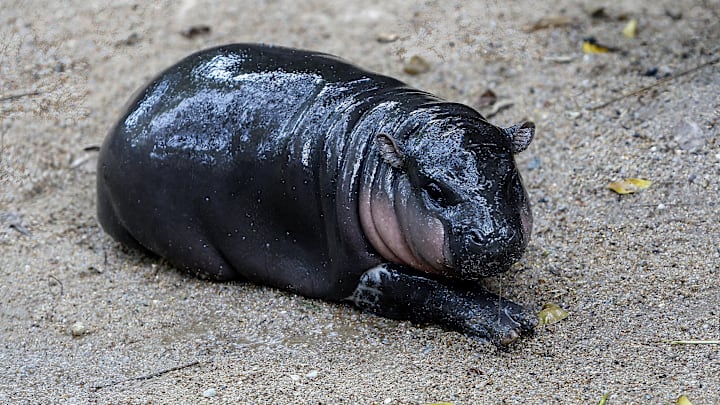Moo Deng—Thai for “bouncy pork” and a type of meatball—is the animal celebrity of the moment. Since the 2-month-old pygmy hippo first appeared on the Instagram page of the Khao Kheow Open Zoo in Thailand, she's inspired memes, t-shirts, and even makeup looks. While that level of obsession may seem baffling to some, there’s a scientific explanation for her popularity.
- The Nurturing Response, Explained
- The Psychology of “Cute Aggression”
- Protecting the Pygmy Hippopotamus
The Nurturing Response, Explained
In short, Moo Deng is just too adorable to ignore. The hippo’s features—round face, big eyes, rosy cheeks, etc.—are neotenic (or baby-like) traits, which trigger our caretaker instincts. Additionally, helplessness is a major factor behind the pygmy hippo’s appeal. Tiny beings like Moo Deng seem defenseless and nonthreatening, which fuels our affection for them.
In 2021, psychologist Hiroshi Nittono told Mental Floss, “One of the critical features that make a thing cute is the absence of feeling threatened. Small things are likely to meet this condition.” A 2009 study also showed that the baby schema, or specific set of characteristics that people generally deem cute, activates nurturing traits in both men and women. This response to cuteness promotes the survival of our helpless offspring—and thus the survival of humanity as a whole.
The reaction isn’t limited to other members of our species. We’re just as likely to appreciate cuteness in animals, and when we do, the regions of our brains associated with pleasure and emotion light up. That may explain why we can’t get enough Moo Deng.
The Psychology of “Cute Aggression”
Strangely enough, some people experience violent impulses at the sight of Moo Deng—specifically saying they want to eat the baby hippo. There’s science behind this reaction as well. It’s called cute aggression, or the urge to behave roughly with adorable creatures. The response is more common than you might assume. Researchers estimate that 50 to 60 percent of people want to squeeze, bite, or crush things they find extra cute.
Yale doctoral students Rebecca Dyer and Oriana Aragón published the first study on cute aggression in 2015 [PDF]. In this experiment, 109 participants were given bubble wrap and shown animals that looked neutral, funny, or cute. When viewing adorable animals, the scientists found that all participants exhibited increased brain activity, but some popped the bubble wrap more aggressively than others. Dyer and Aragón labeled this behavior dimorphous expression, or a contrast between a person’s bodily reaction and feelings. Cute aggression falls under this category.
Katherine Stavropoulos, an experimental psychologist at the University of California, Riverside, conducted a follow-up study a few years later to determine why cute aggression occurs. She found that the reaction correlated with increased activity in the brain’s reward system, suggesting it’s the body’s attempt to regulate unruly feelings.
“It seems as though people who experience cute aggression tend to feel overwhelmed by the strength of their emotions towards the cute thing, whereas people who don't experience it … just don't,” Stavropoulos told Mental Floss in 2021.
Unfortunately, these impulses don’t always stay impulses. Zoo visitors have displayed cute aggression toward Moo Deng by throwing things at her to get her attention. Narongwit Chodchoi, the director of the Khao Kheow Open Zoo, has threatened perpetrators with legal action.“These behaviors are not only cruel but also dangerous,” he said in a statement. “We must protect these animals and ensure that they have a safe and comfortable environment.”
Protecting the Pygmy Hippopotamus
Cuteness aggression is the least pressing problem for Moo Deng’s species. The pygmy hippopotamus is extremely rare, with fewer than 3000 left in West Africa. Habitat loss and hunting are some of the leading causes of their population decline. The Khao Kheow Open Zoo hopes that Moo Deng’s fame will not only help her species, but the other animals at the zoo as well.
Chodchoi has shared plans to patent and trademark Moo Deng the hippo with the goal of bringing in money for the zoo. ”After we do this, we will have more income to support activities that will make the animals‘ lives better,” the director stated. “The benefits we get will return to the zoo to improve the life of all animals here.”
Read More About Animals:
